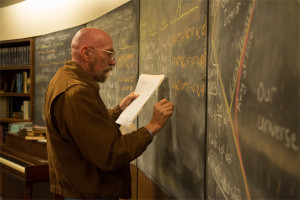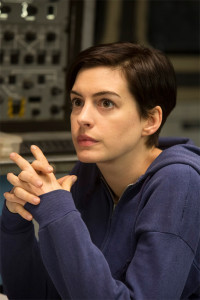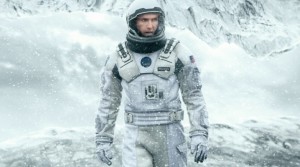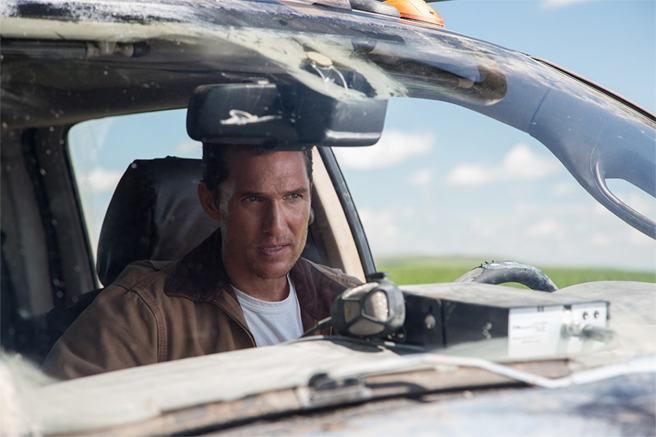Christopher Nolan’s latest, is somewhat of a departure for the director. It’s his first out-and-out Science Fiction film, and has been advertised as a more emotional attempt from the typically cold and intellectual filmmaker. Starring man of the moment and recent Oscar winner Matthew McConaughey, and featuring state of the art special effects filmed in IMAX, Nolan has created an entertaining and interesting film that is hampered by Nolan’s recurring flaws: pedestrian direction, stilted dialogue, and pretentiousness.
Set in the not too distant future, an ecological crisis has caused the Earth’s food supply to run dangerously low. Former test pilot Cooper (McConaughey) receives a message from “ghosts” in his daughter Murphy’s bedroom and in “Close Encounters” style is led to a secret NASA base. A professor (Michael Caine) has discovered possibly viable planets that humanity could escape to. Cooper agrees to travel with a team of astronauts (including Anne Hathaway and Wes Bentley) through a wormhole near Saturn to explore them, leaving his children at home, promising to one day return.
“Interstellar” began as an idea by astrophysicist Kip Thorne, with the film to be directed by Steven Spielberg in 2007. After Spielberg left the project, Jonathan Nolan handed his draft of the script to his brother Christopher who worked his own ideas into the existing screenplay. Thanks to the phenomenal success of his “Dark Knight” Trilogy, Nolan is one of the few blockbuster directors who can get the backing to make non-franchise big budget movies; and it is refreshing to see a big budget movie based on an original idea.

Nolan has often been compared to Stanley Kubrick (somewhat flatteringly in my opinion) due to his cold, austere style and more ambitious approach to storytelling than most Hollywood filmmakers. “Interstellar” obviously owes a huge debt to Kubrick’s “2001: A Space Odyssey” with its meticulously researched vision of space travel, philosophical musings, and a surrealistic, contentious third act. However, the film also contains hallmarks of Spielberg, with its Everyman hero caught up in extraordinary events and focus on fractured families in the crucial subplot between Cooper and Murph (played as an adult by Jessica Chastain).
“Interstellar” does feel like a conscious attempt by Nolan to counter the criticism levelled at his films as being emotionally remote and you can feel Nolan straining to ape the emotional directness of Spielberg. There is one deeply affecting scene when Cooper realises the consequences of his decision to leave his children when, due to the effect of travelling through the wormhole, as minutes pass for Cooper, decades pass on Earth. However, many of these emotional scenes fall flat, mainly due to Nolan’s weakness for over-explaining everything in dialogue by having his characters simply announce their feelings and motivation rather than dramatizing them. Critics often sneer at Spielberg for the emotional directness of his films, but few directors have matched the power of his emotional language in the sci-fi masterpieces “Close Encounters of the Third Kind” and “ET: The Extra-Terrestrial,” and Noland is no exception.
 The casting of McConaughey is a masterstroke. Nolan’s dialogue can lean towards the pretentious and McConaughey, unlike any other Hollywood actor I can think of, effortlessly exudes a down to earth rough-hewn charm that cuts through Nolan’s pomposity. McConaughey wraps his easy Texas drawl around Nolan’s dialogue giving a very human feel to the director’s more overambitious ideas. However, most of the other actors in the film make little impression, save for one surprise cameo that I won’t reveal here. This is mainly due to the fact that the supporting characters are all ciphers, another common Nolan problem: his characters are often plot devices rather than flesh and blood human beings. In fact, the most memorable supporting characters are the mission’s robot helpers TARS and CASE who, in a rare touch of wit from Nolan, have been programmed to have 75% humour.
The casting of McConaughey is a masterstroke. Nolan’s dialogue can lean towards the pretentious and McConaughey, unlike any other Hollywood actor I can think of, effortlessly exudes a down to earth rough-hewn charm that cuts through Nolan’s pomposity. McConaughey wraps his easy Texas drawl around Nolan’s dialogue giving a very human feel to the director’s more overambitious ideas. However, most of the other actors in the film make little impression, save for one surprise cameo that I won’t reveal here. This is mainly due to the fact that the supporting characters are all ciphers, another common Nolan problem: his characters are often plot devices rather than flesh and blood human beings. In fact, the most memorable supporting characters are the mission’s robot helpers TARS and CASE who, in a rare touch of wit from Nolan, have been programmed to have 75% humour.
Nolan does create some fantastic set pieces, including a particularly enthralling escape sequence where Cooper must dock with a damaged space station. The special effects are impressive and the IMAX assisted images are suitably epic, Nolan creating an immersive vision of deep space. However, there is a disappointing lack of ambition in terms of the planets the characters visit. Nolan had the chance to depict an almost limitless range of planets but chose instead to have only a water planet and well, a frozen water planet. The score by regular Nolan collaborator Hans Zimmer deserves credit, counter-intuitively creating an eerie, haunting score rather than the bombastic music expected.
The ending is definitely love it or hate it and will cause plenty of after-film discussion. The ending is reminiscent of the ending of “Contact,” another McConaughey sci-fi film that touches on similar themes of humanity’s place in the universe and father-daughter relationships. Like the ending to “Contact,” some may find the final act of “Interstellar” to be overly sentimental and anti-climactic, but it in fact does perfectly fit the film thematically and emotionally.
 Nolan has created an impressive visual treat and has made a fitfully exciting action blockbuster. McConaughey completes his return to the A list with a commanding and heartfelt performance, and the film is full of interesting sci-fi ideas. However, Nolan needs to correct his tendency to over-explain everything and his strangely airless style before he joins the exalted ranks of directors like Kubrick and Spielberg.
Nolan has created an impressive visual treat and has made a fitfully exciting action blockbuster. McConaughey completes his return to the A list with a commanding and heartfelt performance, and the film is full of interesting sci-fi ideas. However, Nolan needs to correct his tendency to over-explain everything and his strangely airless style before he joins the exalted ranks of directors like Kubrick and Spielberg.
– by Craig Adgie


